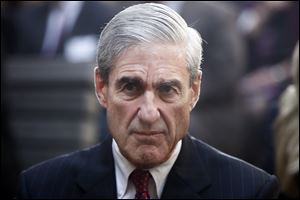
Open the Mueller mandate
5/12/2018
The scope of Special Counsel Robert Mueller’s probe, ostensibly on Russian meddling in the 2016 presidential election, has not been clearly delineated.
It is time for Deputy Attorney General Rod Rosenstein and Special Counsel Robert Mueller to talk to the American public.
Tell us what you are doing and why, gentlemen.
It is time for transparency.
Click here to view more Blade editorials
The public was told at the beginning of the Mueller probe, when the former FBI director was named special counsel in May, 2017, that the investigation was to be of allegations of attempted Russian meddling into the last presidential election and any coordination with the Trump campaign.
It has now been well established, by the press and the House Intelligence Committee, that the Russians did attempt this meddling, albeit very clumsily.
The House Committee’s Republicans also said the Trump campaign was naive and careless about its contacts with Russians, but that there was no collusion of the campaign with the Russians.
If this is not what Mr. Mueller has found, if he has found more, he should tell his superiors at the Justice Department, the Congress, and the American public — soon.
He should tell a grand jury if he has evidence of wrongdoing with respect to Russia.
Like the House Committee, Mr. Mueller has had a year to dig.
But something seems to have gone awry with the Mueller inquiry. It seems to have become a fishing expedition and it seems to be one aimed at the president of the United States. That is what federal Judge T.S. Ellis observed the other day. He told one of Mr. Mueller’s lawyers he wanted to see the full, unredacted memo from Mr. Rosenstein authorizing the probe.
The judge ought to see it. The whole country ought to see it at this point.
The reason the deputy AG appointed the special counsel in the first place is that Attorney General Jeff Sessions felt he had a conflict, since he had served as an adviser and surrogate for the Trump campaign and had held private meetings with Russian diplomats. The Russians were supposed to be the point of inquiry.
Mr. Mueller was authorized to look into any matters arising “directly from the investigation.” But now the Mueller investigation has veered into the antics of the President’s personal lawyer and possible obstruction of justice of that probe — by the President. And no one knows what else.
Moreover, with the leaking of the possible Mueller questions to the President, the whole investigation has taken on a very disturbing, extra-legal, and un-American quality.
This is why the independent counsel law was abolished — it gave the independent counsel virtually unlimited powers. It gave him the power to keep fishing until he found a crime. It violated the separation of powers doctrine enumerated in Articles I, II, and III of the Constitution, as Justice Antonin Scalia wrote in a famous dissent. But it also violated principles that are even older and derived from the common law, indeed from natural law. We call these principles due process of law, justice as fairness, and equality before the law.
KEITH BURRIS: Due process for those we don’t like
We don’t investigate people for one thing, fail to prove it, and then switch to something else — not in this country.
We don’t allow a special prosecutor to keep going until he finds something. They do that in North Korea and Russia. We don’t do that in the United States of America.
In the U.S., we have equality before the law. We do not suspend this principle for political opponents or those we dislike or despise.
And in the U.S., no one has unlimited, or unchecked, power — not the president, not the FBI or CIA, and not, as the Judge Ellis pointed out, the special counsel.
Otherwise the special counsel becomes a de facto independent counsel which, as writer Terry Eastland said of the Scalia dissent, compelled “investigations that would not be opened and prosecutions that would not otherwise be brought.”
The difference between an independent counsel and a special counsel is that the latter is limited — limited to his mandate.
So the public has a right to know what the mandate is. What are Mr. Mueller’s limits? What did Mr. Rosenstein tell him, in writing, he could and could not do? Is he confined to the Russia matter as the country was led to believe, or can he fish wherever he pleases? If the latter is the case, Mr. Rosenstein should rein Mr. Mueller in.
Mr. Mueller should not be fired. He should be limited and accountable, like every other public servant in a constitutional system. That is not for the sake of Donald Trump or any of his associates, but for the sake of the concept, and the practical pursuit, of justice.